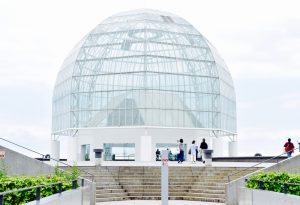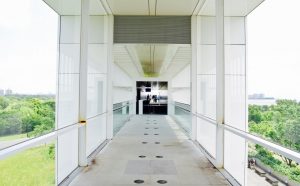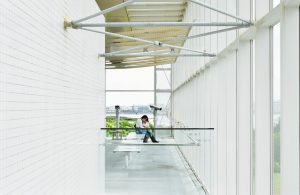Today we had the honor of visiting Oguma Eiji, the historical sociologist, Keio University professor, guitarist, and documentary filmmaker who directed “Tell the Prime Minister”–at his house, no less. To be honest, I was really nervous beforehand. Was my reading and preparation adequate? Did I watch his documentary in enough detail? Would I ask good enough questions?
In the end, I wound up just listening and observing. It was very interesting hearing how Oguma Eiji got to where he is today. Apparently, he studied physics and agricultural biology as an undergrad, did his master’s thesis in sociology, and his doctor’s in foreign policy. Oguma Eiji was interested in how invisible desire or collective consciousness is present in anthropology, and also how that plays into the Japanese identity. I was also intrigued by how he didn’t really self-identify much as an activist or writer. I was also very impressed with how fluent his English was.
~~~
Later, we went to the Ghibli Museum. As an avid fan of anime (insert shameless plug for Bowdoin Animation Society) who’s interested in the environment, this was a really fascinating visit, since many of Miyazaki’s films deal with the environment and technology (looking at you, Princess Mononoke, Nausicaa of the Valley of the Wind, etc.). As a bit of a sketch artist myself, it was wonderful to see the early concept art and sketches for various films I had seen, such as Princess Mononoke, Spirited Away, Grave of the Fire Flies, Howl’s Moving Castle, and others. One particularly interesting exhibit was the exhibit on food in Ghibli movies; afterwards, we had an engaging discussion pn food culture with Selinger-sensei sitting outside the museum gift shop (yes, I caved and purchased Spirited Away playing cards). It really took me back to first year fall, when I took Selinger-sensei’s Japanese Animation freshman seminar. As a slightly relevant aside and another shameless plug, if you (as the reader) are interested at all in any Ghibli films, or anime films in general, Bowdoin has a number of films on reserve in the Library Media Commons (in the basement of Hawthorne-Longfellow Library). I’m still working on compiling them all, but a partial list can be found here (yes, yet again a shameless plug):
http://students.bowdoin.edu/bowdoin-animation-society/



